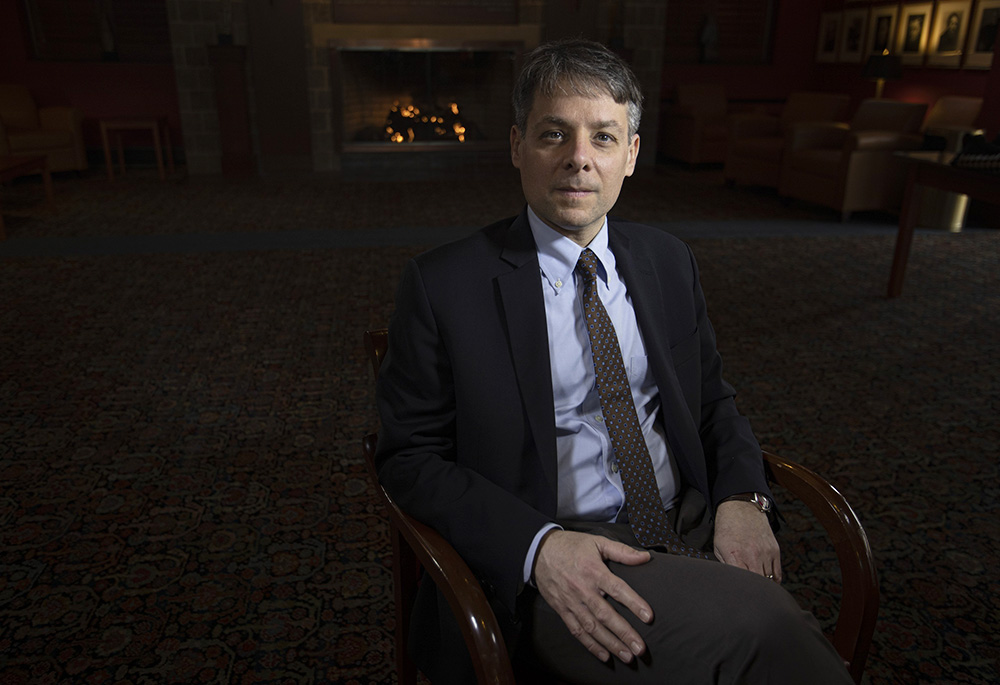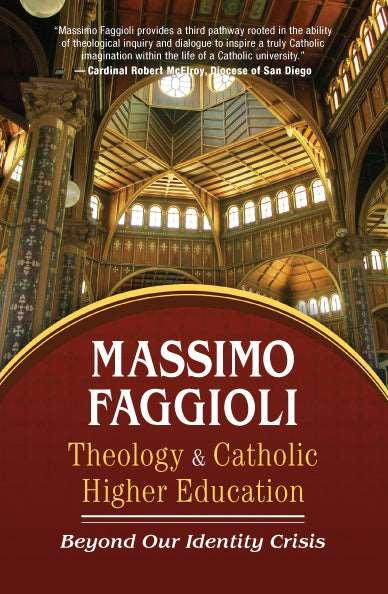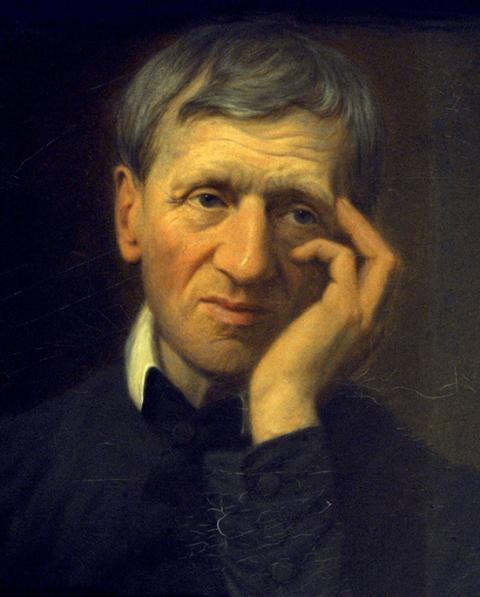
Massimo Faggioli, professor of historical theology at Villanova University near Philadelphia, is seen on the Catholic university's campus March 11, 2021. (CNS/Chaz Muth)
Massimo Faggioli's new book, Theology & Catholic Higher Education: Beyond Our Identity Crisis, comes not a moment too soon. The nation's premier ecclesiologist, Faggioli identifies the dangers facing theological faculties in their struggle for existence as a problem for the church, not just the university. What is more, he sees that solving the problem will require the attention and good faith of both the academic and the ecclesial establishments. This is a short book, but not a thin one.
Faggioli begins by examining the identity crisis afflicting theology in the country's schools of higher education. Some of the problems are self-inflicted wounds, and others represent external threats. The wave of young neo-traditionalists who reject Vatican II can turn to niche schools like Christendom College or to non-academic, pseudo-experts who populate the internet. They will not turn to theology at a mainstream Catholic university because "the growing polarization in the United States between left and right in theology … relegated Catholic theology in universities to being the handmaiden of political progressivism."

Book cover to Theology & Catholic Higher Education (Orbis Books)
A related problem followed upon, not to say caused by, the loss of ecclesial control over Catholic higher education. "At the very moment many Catholic colleges and universities were freed from episcopal interference, they happily surrendered to the influence of corporate donors eager to fund conservative projects on Catholic campuses — projects that often combined theological traditionalism with neo-liberal or libertarian economic ideology," he writes.
This is a theme that runs through the book. The important 1967 Land O' Lakes statement on the necessity of academic freedom at Catholic schools achieved its goal, but left Catholic schools unable, or unwilling, to withstand the onslaught of technocratic and market-oriented ideas and practices from enslaving them anew. These latter chains are marginalizing theology and the humanities without which theology cannot be done.
One hundred and seventy-two years after St. John Henry Newman defended liberal education and warned about the temptation to see higher education as a form of vocational training in his magisterial The Idea of a University, many Catholic schools have followed the path of their secular colleagues, in which business schools, engineering and the hard sciences garner the students, funding and prestige once accorded to history and theology and literature. Boston University is suspending programs in the humanities. Marymount University in Northern Virginia eliminated theology along with other humanities majors in 2023. The phenomenon is not unique to Catholic schools but Catholic schools face a question their secular counterparts do not: How can a school be Catholic and, at the same time, minimize the role of theology in a student's general education?

St. John Henry Newman, pictured in an undated painting (OSV News/Courtesy of the Bishops' Conference of England and Wales)
In analyzing the problems afflicting Catholic higher education, Faggioli, with great delicacy, takes no prisoners on either the left or the right. In place of a rigorous theology that is also connected to the lived experience of the church, neo-traditionalist Catholics participate in the "revolt of illiberal populism" and produce a reactionary Catholicism. Young people are not normally attracted to reaction which always entails a kind of anti-aspirational negativism. On the other hand, in an intellectual climate that questions everything, some people look for stability where they can find it and create a false sense of the Catholic intellectual tradition as an unchanging, and unchangeable, thing.
One problem on the left is the identification of Catholicism "not just historically but essentially with racism, colonialism, and sexism," Faggioli writes. "It is a view that sees tradition as wholly oppressive rather than having the potential to possibly be liberating, as life denying rather than holding potential to be life-affirming." It is hard to imagine young students signing up for an elective in theology unless they are interested in learning more about their faith. Being met by teachers who scorn the tradition is unlikely to whet their appetite to learn more about theology.
Each of the chapters in this book take on one aspect of the problem, and in each case, Faggioli's ability to see both sides of a problem shines through. The arguments he makes in the chapter on the "interrupted reception of Vatican II" will be familiar to those who read his earlier book, Vatican II: The Battle for Meaning. Here, however, he examines the academic, not only the ecclesial, consequences of the "neo-conservative ideologization of Catholicism."
In analyzing the problems afflicting Catholic higher education, Faggioli, with great delicacy, takes no prisoners on either the left or the right.
As he often does, Faggioli draws conclusions about cultural developments that follow from his observations of academic trends. For example, he writes, "Theological and political polarization have fueled one another and become a theologization of political identities and a politicization of the ecclesial discourse." That is profoundly true. (His penchant for creating neologisms is not bothersome because it is never used to obscure, always to explain. It is the opposite of jargon. He creates words that need to be created.)
In examining the breakdown in relationships between the hierarchy and academic theologians, Faggioli is again evenhanded and nonjudgmental. On the one hand, freed from episcopal control, few theologians remained interested in episcopal engagement. And in their turn to social sciences as discussion partners, theologians followed other academics into the areas of study that seemed most vital to the zeitgeist, race, gender and sexuality, areas where modern culture and Catholic teaching were most far apart. On the other hand, he notes that the "episcopal hierarchy is partly to blame if theologians, looking to do something consequential, responded by looking outside the institution [of the church] to make their mark."
Faggioli also provides a fine analysis of Pope Francis' comments about the mission of theology, celebrating the end of the overtly antagonistic relationship between academic theology and the Roman Curia, but also pointing to the fact that theologians were not invited to play much of a role in the synodal process.
His penchant for creating neologisms is not bothersome because it is never used to obscure, always to explain. It is the opposite of jargon. He creates words that need to be created.
The change from clerical boards of trustees to lay-led boards was foreseen and celebrated by Catholic reformers at the time of the Land O'Lakes statement, but no one at that time appreciated how profound the change would be. Schools led by clerics and religious sisters never found themselves discussing their Catholic identity, it walked in with the sisters and clergy. Nor was it uncommon for lay Catholics in the mid-20th century to identify their neighborhoods by the name of the parish church. All of that went away in the past few decades.
"The transition in Catholic universities to lay presidents and administrators has paradoxically contributed to the lack of interest in these institutions in an ecclesiology that proposes to give more voice to lay people," he writes. Lay presidents and boards might or might not be interested in theology, might or might not know much about it. If they are interested in it, and seek to make Catholic identity a defining characteristic of the schools they lead, that identity will almost always be more of an intellectual, conceptual reality. The sisters lived in poverty, they did not just talk about it. The priests and sisters had just finished matins and lauds before they walked into the classroom. Their Catholicism was broadly cultural and experiential, not only notional.
Faggioli notes many times the dangers of anti-intellectualism in the life of the church and the life of society. He writes of a "new form of Catholic anti-intellectualism" in which "the collapse of high culture and popular culture are fueled by the new media and social media … in which popular online preachers, proudly not belonging to academia, are redefining the relationship between knowledge and one of the most important producers of it in Western history, the Catholic Church." This is a problem bishops must wrestle with too as online formators try to convince seminarians to ignore the teaching they receive in the classroom and, instead, trust the reactionary nonsense being peddled on social media.
Advertisement
He is equally withering in his critiques of developments within the faculty lounge. "If theologians focus on ethnography, cultural studies, and activist political theology, leaving behind the dogmatics, patristics, ecclesiology, philosophical and fundamental theology, eventually the vacuum is going to be filled by the self-appointed 'watchdogs,' policing grace in this new quest for a kind of ultra-vigilant Catholic pride." That is spot-on, and it is also some very fine writing.
Indeed, this book is studded with excellently written sentences, enclosing key insights, that jump off the page. We read: "There is no Catholic tradition without Catholic social thought, but the Catholic tradition is more than Catholic social thought." And this: "Now universities have become seminaries of another religion: seminaries for the formation of the high priesthood of capitalism and for the minor orders of the service economy." And this: "Unless it abandons a gladiatorial role, in constant and semi-automatic takedown of the teaching of the church, theology will experience more humiliation rather than humility."
Faggioli touches on the role of diversity, equity and inclusion (or DEI) programs at contemporary Catholic universities, rightly noting that such programs cannot replace Catholic identity. One wishes he had delved more deeply into the topic. Many — most? all? — Catholic colleges and universities adopted DEI programs uncritically, without asking basic questions of how DEI intersects with Christian anthropology. DEI advocates, and multicultural scholars before them, usually espouse, in some form, the Herderian idea that cultures are incommensurable. That idea cannot square with Catholic anthropology. We believe grace transcends everything: race, gender, nation, sexuality. Yet, as ethical values, diversity, equity and inclusion have an obvious correspondence with the Catholic ethical worldview. The modern academy would benefit from Faggioli's deep thoughts on this issue.
'Unless it abandons a gladiatorial role, in constant and semi-automatic takedown of the teaching of the church, theology will experience more humiliation rather than humility.'
—Massimo Faggioli, Theology & Catholic Higher Education
The final chapter includes practical recommendations for addressing the problems Faggioli has identified and I agree with everything he writes there. If you want to know what those proposals are, you will need to buy the book!
And you should. Faggioli's book joins the esteemed canon of works that focus on questions about what a university should be. In addition to Newman's famous The Idea of a University, there is Spanish philosopher José Ortega y Gasset's 1946 book Mission of the University, Jaroslav Pelikan's 1992 The Idea of a University: A Reexamination, and evangelical scholar George Marsden's 1997 book The Outrageous Idea of Christian Scholarship. All of these books shed light on the topic at hand.
The worry is that the contemporary Catholic college and university may lack the kind of intellectual leadership to make the changes needed if their Catholic identity is to be saved. The market-oriented model of higher education has pulverized more classical understandings of what it means to educate a young person. The problems Faggioli identifies are real but that doesn't mean solutions will be found or, if found, embraced.
I will add one practical solution to the conundrum. Anyone on a hiring committee for administrators or academic posts at Catholic universities should ask the candidates to discuss and critique Faggioli's book. If the candidate can't do it, or doesn't know the book, keep looking. Leaders in Catholic higher education need to recognize that Catholic identity will not crimp on their academic freedom. On the contrary, it may be the thing that saves these wonderful institutions of Catholic education.








